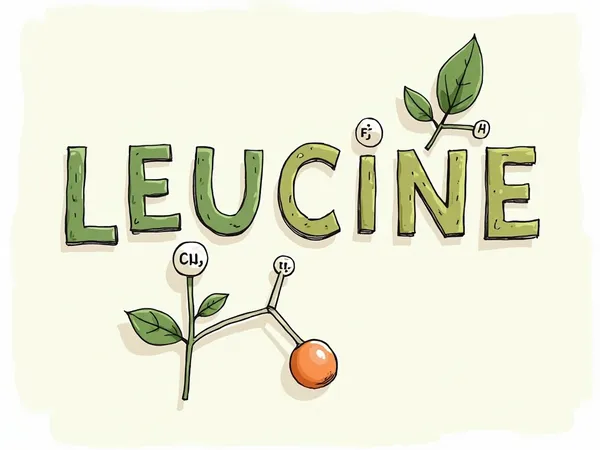
Ready to Start Your Wellness Journey?
Become a Herbalife Preferred Member and enjoy exclusive discounts of up to 25% on all products.
BECOME A PREFERRED MEMBERLeucine Muscle Growth: A Science Based Training Guide
Introduction
Leucine is an essential branched-chain amino acid (BCAA) that plays a critical role in protein synthesis and metabolic regulation. The human body cannot synthesize leucine, making dietary intake vital. It is popular among athletes for supporting muscle growth and recovery and is involved in insulin secretion and tissue repair processes.
In this comprehensive article, we explore how leucine works in the body, the consequences of deficiency, top dietary sources, benefits supported by scientific research, and practical tips to ensure adequate intake.
Role in the Body
Leucine serves as both a building block for proteins and a signaling molecule that activates pathways responsible for muscle protein synthesis. Elevated leucine levels after a meal stimulate the mammalian target of rapamycin complex 1 (mTORC1), a key regulator of cell growth and metabolism. Studies have reported that meals enriched in leucine can enhance postprandial protein synthesis compared to meals with lower leucine content.
Specific Functions
• Stimulates muscle protein synthesis through mTORC1 activation
• Supports insulin secretion and enhances glucose uptake in muscle cells
• Donates nitrogen for the synthesis of other amino acids and metabolites
• Contributes to energy production during exercise via oxidation in muscle mitochondria
• Supplies substrates for collagen formation in wound healing
Effects of Deficiency
Leucine deficiency is uncommon in balanced diets but can occur with inadequate protein intake or certain metabolic conditions. Potential signs include:
• Reduced muscle protein synthesis leading to muscle weakness
• Slower wound healing and impaired immune responses
• Challenges in blood sugar control due to decreased insulin secretion
• Increased fatigue and reduced exercise capacity
• In severe cases, cognitive symptoms and mood alterations
Dietary Sources
Since the body cannot produce leucine, dietary sources are essential. Common foods rich in leucine include:
Best Food Sources
• Lean beef (2.5 grams of leucine per 100 grams)
• Chicken breast (1.7 grams per 100 grams)
• Pork loin (2.3 grams per 100 grams)
• Salmon (1.5 grams per 100 grams)
• Eggs (0.5 grams per large egg)
• Cottage cheese (1.2 grams per 100 grams)
• Yogurt (0.8 grams per 100 grams)
• Milk (0.3 grams per 100 ml)
• Soybeans (1.3 grams per 100 grams)
• Lentils (0.6 grams per 100 grams)
Supplementation
When dietary intake is insufficient or increased demand exists, leucine supplements or BCAA formulations can be considered:
• Athletes may use supplements containing 2–3 grams of leucine per serving to support muscle protein synthesis
• Individuals on calorie-restricted diets may require supplementation to meet optimal leucine levels
• Older adults may benefit from higher leucine intake per meal to counter reduced anabolic response
• Clinical nutrition formulas enriched with leucine are used to support recovery in surgical or critically ill patients
Health Benefits
Research indicates that adequate leucine intake may offer several health benefits:
1. Muscle Growth and Strength
Leucine is a key activator of muscle protein synthesis. Studies have shown that leucine supplementation in conjunction with resistance exercise can improve gains in muscle mass.
2. Exercise Performance
As an energy substrate, leucine oxidation during prolonged exercise may help delay fatigue and reduce muscle soreness.
3. Metabolic Health
Leucine supports insulin secretion and glucose uptake in muscle tissue, which may contribute to maintaining healthy blood sugar levels.
4. Weight Management
High-protein diets containing ample leucine can enhance feelings of fullness and help preserve lean muscle mass during weight loss.
5. Aging Muscle
Leucine-enriched meals have been shown to stimulate muscle protein synthesis more effectively in older adults compared to lower-leucine meals.
6. Wound Healing and Immune Support
Leucine provides nitrogen necessary for collagen production and supports immune cell function during recovery.
Daily Requirements
• Adults (19+ years): 39 mg per kg of body weight per day
• Pregnant and breastfeeding women: additional intake above standard adult requirements to support fetal growth and milk production
• Athletes and highly active individuals: 2–3 grams of leucine per meal to maximize muscle protein synthesis
Tips for Incorporation
• Combine various protein sources to obtain a balanced amino acid profile.
• Include high-leucine foods (e.g., meat, dairy, soy) in each meal.
• Consider fortified protein supplements if dietary intake is low.
• Distribute protein and leucine evenly across meals to maintain muscle protein synthesis.
• Use leucine-rich snacks like Greek yogurt or roasted soy nuts between meals.
• Consult a registered dietitian to tailor leucine intake to individual needs.
Conclusion
Leucine is an essential amino acid vital for muscle protein synthesis, metabolic health, and recovery. Ensuring sufficient intake through diet—and supplements when necessary—can support overall health and physical performance.
"Nutrition is not just about eating; it's about investing in your body, your vitality, and your future." — Registered Dietitian Jane Smith
Disclaimer: This article is for informational purposes and should not replace professional medical advice. Consult a healthcare professional or registered dietitian before making significant dietary changes.
Ready to Start Your Wellness Journey?
Become a Herbalife Preferred Member and enjoy exclusive discounts of up to 25% on all products.
BECOME A PREFERRED MEMBER